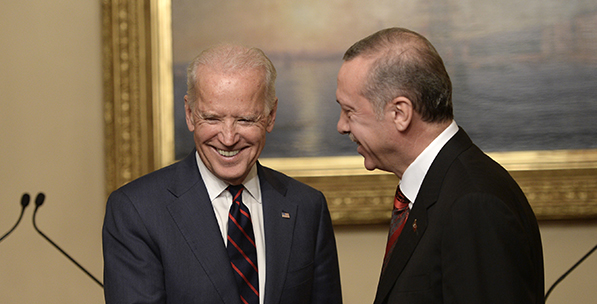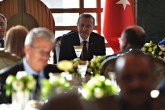Winston Churchill once said “Never let a good crisis go to waste.” Crises and tensions in bilateral relations between countries sometimes pave the way for opportunities to build a more sustainable cooperation. The recent disagreements between Turkey and the U.S., especially over the conflict in Syria can become an opportunity for the two countries to modify their mode of partnership and form a new working relationship. After so many attempts to find a name for the partnership, i.e. strategic partnership, enduring partnership, transactional partnership and model partnership, this crisis may present the two countries with an opportunity to assess the possibility of new forms of cooperation and coordination in their foreign policies.
American-Turkish relations have been going through a challenging period since the intensification of the crisis in Syria, especially in the last two years. The dramatic chemical weapon attack on the town of Ghouta, and the U.S. decision not to launch airstrikes against Syrian regime targets in the aftermath of this unprecedented challenge to international norms resulted in a deterioration of the situation. Since then, although the leaders of the two countries have constantly reiterated their commitment to the strategic partnership, there has been a serious build-up of tension that cannot be ignored. Unfortunately this tension is rising in a period when the region has been passing through one of the most complicated and tumultuous episodes of its history, and when the two countries need the cooperation and coordination of their security policies. It is important to understand that both ISIS and the Syrian regime constitute a similar type of threat for the stability and peace in the region, and although many in the U.S. have begun to consider the Assad regime a “lesser evil” in recent weeks, both the U.S. and Turkey have mutual interest in dealing with these threats at the same time.
It is not a secret that the year 2014 did not see the best period in relations between the U.S. and Turkey. The fallout from the year 2013, including the tension in the aftermath of the use of chemical weapons by the Assad regime, and differences of positions following the coup in Egypt, created a divide between the policies of these two countries in regards to the most significant developments in the Middle East. The perspective of the two countries about the future of the region began to seriously diverge. The U.S. started to consider authoritarian stability a “better option” in Egypt, and an autocracy a “lesser evil,” and resisted any form of pressure from the international community. However, this was a formula that had been tested for many years during the Cold War and in its immediate aftermath. This default setting of “lesser evils” can provide security at the expense of democracy, and it is true that liberty has not brought any form of stability to the region. To assume that Assad is the “lesser evil,” however, and can be instrumental in the fight against ISIS will not only damage U.S. relations with Turkey, but can also help ISIS to recruit more people from the anti-Assad groups and will give an opportunity to Assad to declare “his own war on terror.” In this war of Assad, moderate and local opposition groups in Syria will be the biggest victims. This would mean the loss of the only potential allies of Turkey and the U.S. on the ground. In order to avoid this, a political/military strategy needs to be devised that will end the rule of Assad in Syria, while at the same time, responding to the security concerns of Turkey, the U.S. and the Syrian people. It also requires an effective mechanism of intervention to resolve the conflicts, before any form of retribution or planning of reconstruction with the help of an international initiative can be considered. This would create a new pattern of cooperation between the U.S. and Turkey that will also help to form a long-term shared perspective in regards to the region.
Secondly, the fear that ISIS has caused as a result of its brutality and
In this article
- Foreign Policy
- Opinion
- 2013
- 2014
- Assad Regime
- Bashar Al Assad
- Cold War
- DAESH
- Egypt
- Fight against DAESH
- Fight Against Terror
- Middle East
- Opposition
- Strategic Partnership
- Syria
- Syrian Civil War
- Syrian Conflict
- Syrian Crisis
- Syrian Regime
- Turkish Foreign Policy
- Turkish-American Relations
- Türkiye-US Relations
- United States (US)



